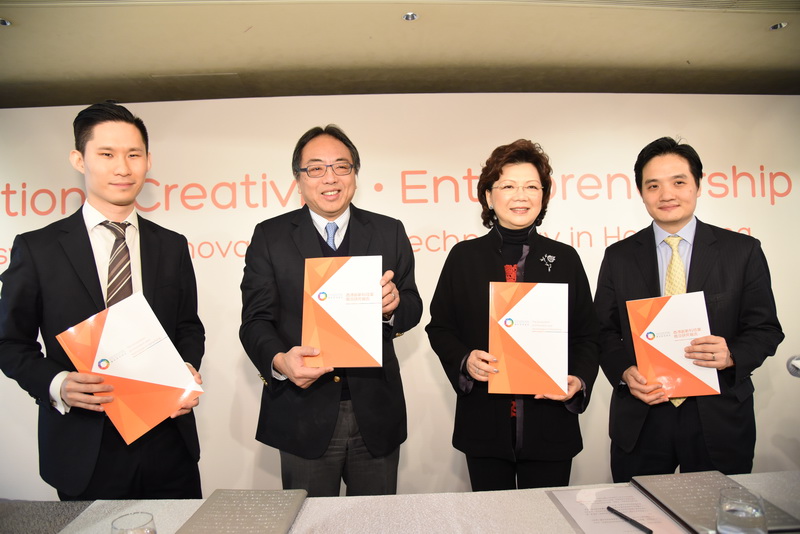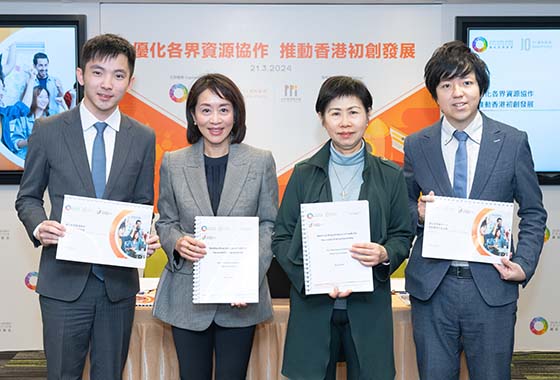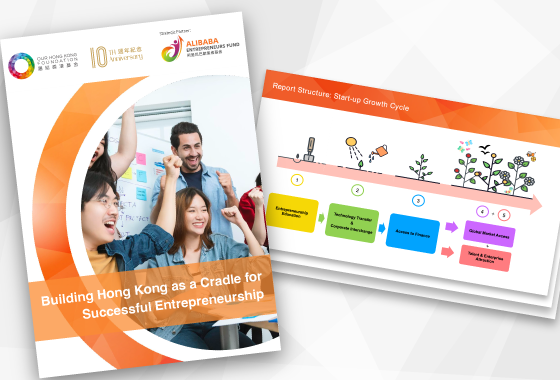OHKF Research Report Proposes Injection of $50 billion into Research Endowment Fund
(Hong Kong, 18 December 2015) Our Hong Kong Foundation (OHKF) today published their second research report, proposing that the Government inject an additional $50 billion into the Research Grant Council (RGC) as a research endowment fund.
The report suggests that that the University Grants Committee (UGC) review their mechanism for assessing university performance which attaches too much importance to their academic publications, and stresses that academics should focus more on the impact of their research on the economy, society and the culture, and that more weight should be given to project-based orientation and the element of competition in UGC’s R-Block.
The Foundation also advocates that Hong Kong follow the global trend, with the entire community coming together to promote innovation and technology. The Report also states that talent is the key to driving innovation and technology, and talent development and economic development should go hand in hand and complement each other.
The Report also urges that Government take the initiative to significantly increase R&D investment and beef up Hong Kong’s local R&D capabilities. Hence it proposes that the Government increase the current annual R&D spending of only 0.4% of the GDP to 1%, narrowing the gap with neighbouring regions and international cities.

From left to right: Mr Edwin Cheung, OHKF researcher; Prof Lap-chee Tsui, former President and Vice-Chancellor of
The University of Hong Kong and Founding President of the Academy of Sciences of Hong Kong;
Mrs Eva Cheng, OHKF Executive Director; Mr Stephen Wong, OHKF Deputy Executive Director and Head of Public Policy.
Apart from increasing fund allocation as well as reforming the universities’ key performance indicators and the funding mechanism, the Report also made strategic proposals in four areas.
First, enhance coordination and cooperation among the government, the business sector, and academia, and give incentives to industry and business to invest in scientific research.
Second, enact timely legal regulations to boost vitality in the market and encourage the development of financial technology such as peer-to-peer lending and crowd funding.
Third, expedite Hong Kong’s development into a smart city, such as providing city-wide use of free Wifi, and opening up data and information.
Fourth, creating synergy with the Mainland, in particular enhance the collaboration and development of scientific research with Hong Kong’s neighbouring areas.
The second research report released by OHKF is entitled “The Ecosystem of Innovation and Technology in Hong Kong.” It was carried out under the leadership of Prof Lap-chee Tsui, former President and Vice-Chancellor of The University of Hong Kong and Founding President of the Academy of Sciences of Hong Kong.
The report points out that Hong Kong has excellent soil to nurture scientific research, and in recent years Hong Kong’s scientific research projects had won numerous prizes in international exhibitions of inventions, and even opened up global markets. However, the investments made by the Government and the community are significantly below international level and even its neighbouring regions. The Report points out that the Government’s injection of funds into scientific research amounts to only 0.4% of the GDP, trailing behind the 0.8% of Singapore and Korea.
At the press conference to announce the findings, Prof Tsui stressed that scientific innovation is the main thrust for global economic development, and increasing spending on scientific research is the most valuable investment.
Prof Tsui said, “Basic research in innovation and technology can have a positive impact on economic development. However, to forge a complete ecological chain for innovation and technology, we need basic research on the upstream, translational research in the midstream, and applied research on the downstream.
“If we look at the macro-environment of innovation and technology in Hong Kong, we will find that Hong Kong lacks a comprehensive ecological chain for innovation and technology, and there is no effective linkage between the upstream, midstream and downstream. To solve this problem at the root, we need to ride on the Government’s capacity to adopt comprehensive and long-term measures to improve on the ‘broken chain’ that we have today.”
OHKF Executive Director Mrs Eva Cheng said at the press conference, “Innovation and technology has become a strong driving force that propels the economic development and social progress of a country or a region. In the future, competition among countries and among regions will take place in the arena of technological invention and innovative capability.”
She said, “At the start of this year, OHFK selected ‘innovation and technology’, ‘social innovation’ and ‘art innovation’ as the themes for our research, because we anticipated that ‘innovation and technology’ will become a huge economic driver and bring about cataclysmic changes. It may even lead to the elimination of various jobs and job categories. We believe that when the social pattern is completely redefined, the development of social innovation and art innovation will alleviate the impact and labour pains in the process of change.”
Mrs Cheng concluded, “Innovation and technology is a mega trend, and it is imperative that Hong Kong progresses in this right direction. After all, Hong Kong is a cradle of talents, blessed with the proximity of the huge Chinese market. If Hong Kong can embrace this unprecedented opportunity, we will definitely open up a bright future of innovation.”



